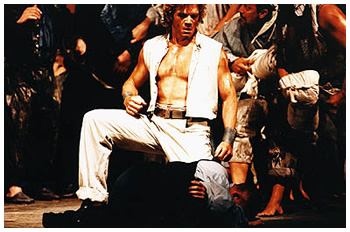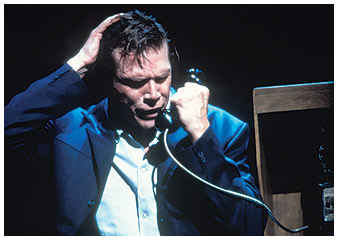 Rodney Gilfry in Billy Budd at the Dallas Opera.
|
In 1985, he auditioned in Europe and signed a two-year contract with the Frankfurt Opera. With daughters Carin, age 2, and Erica, 3 months, he and his young wife relocated to Germany in 1987, leaving their close-knit families and friends behind in America. “I said to Tina, ‘We’re just going to go for two years. I’m going to make a big splash, make all my contacts, and then it won’t matter where we live. We can move back, and I’ll have an gilfry career.’ It took seven years to do that.” When the Gilfrys went to Europe, life became difficult for them all. As for Tina, who had enjoyed a full schedule as a mother, kindergarten teacher, Jazzercise instructor and graduate student in Southern California, “It was really hard. I knew he needed to do it, but I gave up a lot. I gave up all my friends, my family, and suddenly, boom, I’m just a mom. But, I don’t like to feel bad for very long. I thought, ‘What am I going to do?’” With determination, she started teaching Jazzercise classes, deciding that “all I’ll have to learn, in German, is how to count to eight, and body parts and some words like ‘lift,’ ‘walk’ and ‘jump’ … and it was good, because they had nothing like that.” His initial experience in Europe “was exciting, but frightening. The culture shock was tremendous, just being thrown into it like that with nobody to hold your hand.” Overall, the two years in Frankfurt were “very disappointing.” Just days before the company’s season premiere, the recently rebuilt opera house burned down, so they performed in an adjacent black-box theater that accommodated 400 people—seemingly taking the “grand” out of opera. The season opener, which also may be Gilfry’s most unusual opera experience, was a John Cage piece called Europeras 1 and 2. He described it as “crazy” and “practically abusive. Basically, [Cage] took 64 operas that were in the public domain and had a computer program select bars of music at random from these operas and assembled them at random. The stage was divided into a grid, and all the stage directions, timing and movements were designed at random. There was no conductor, just a digital clock that everybody had to follow. So the directions were, ‘Enter in square F-15 at two minutes and 53 seconds, go to D-7. One of the things I sang was the bullfighter’s song from Carmen. I was dressed as a Mexican cowboy, throwing sticks down toward D-32, or something. It was really, really difficult.” It was during this period that Gilfry took on his first starring role—the title role in The Marriage of Figaro in Hamburg in 1986. Switzerland was the next stop for the family—which now included son, Marc—when Gilfry signed with the Zurich Opera in 1990. “The weather was so much better, the people were much more international,” he said. “We lived in a wonderful little neighborhood with wonderful neighbors. We have really fond memories of that time.” After seven years in Europe, it was time to return to the states. “[Tina and I] had talked about how we wanted our kids to grow up in California. We missed our families. I thought it was going to have to be a real sacrifice. As soon as those wheels left the runway it felt so right, and I was so at-peace with it. I’ve never looked back.” |
